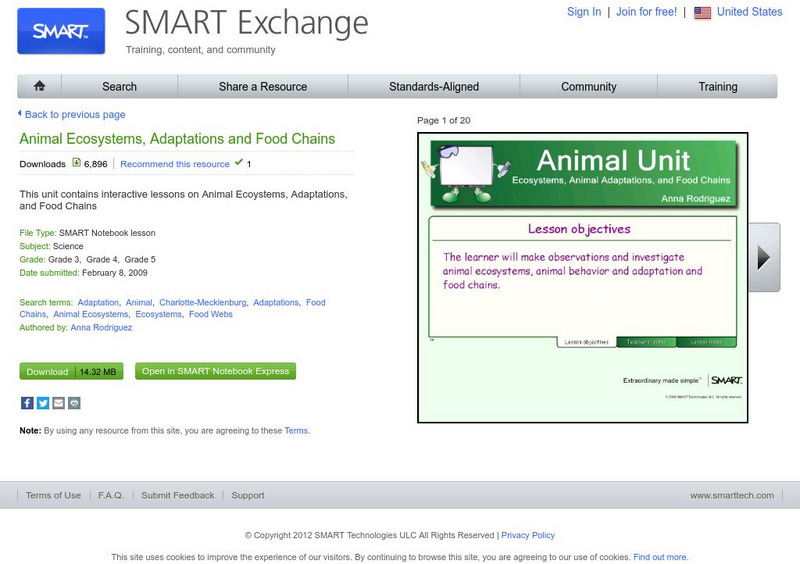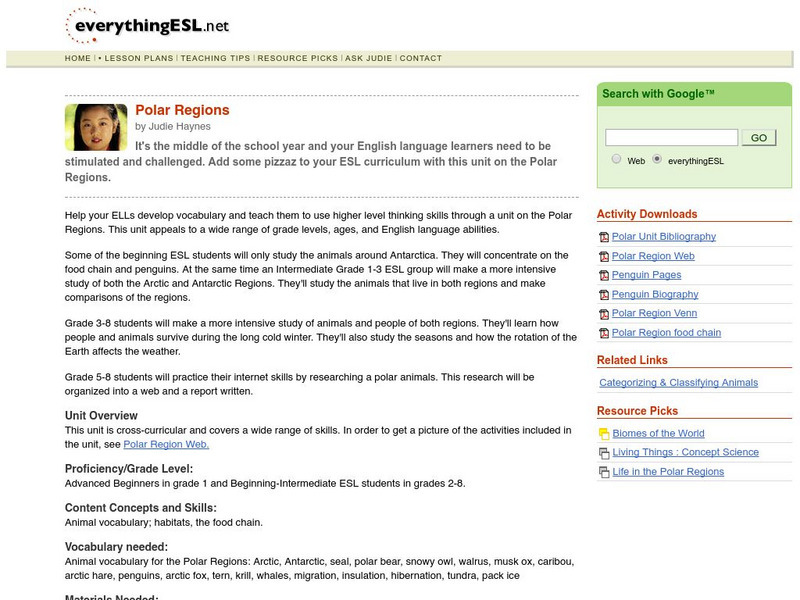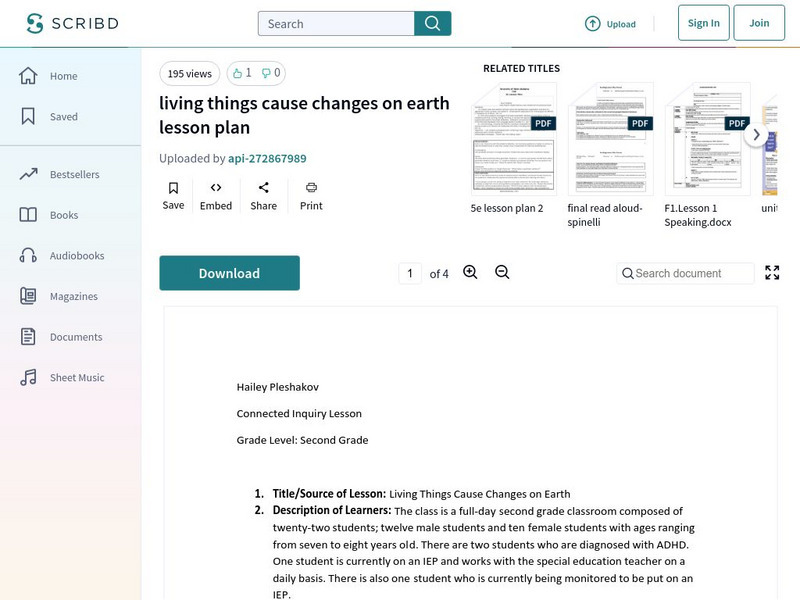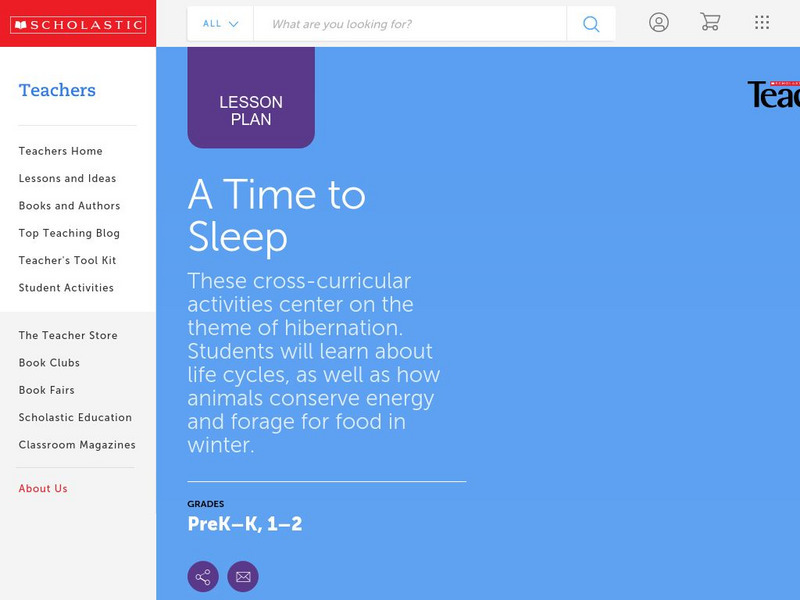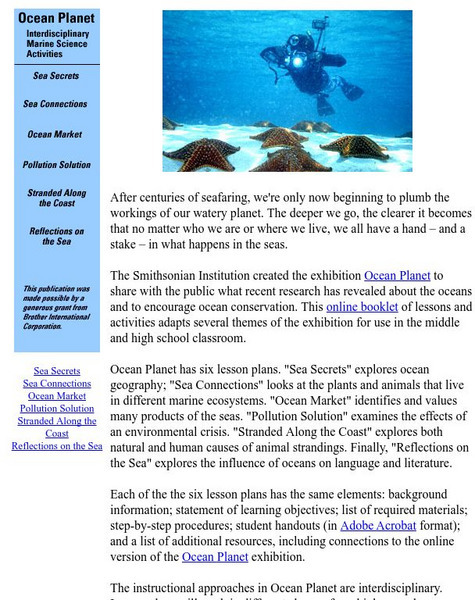Hi, what do you want to do?
Curated OER
The Planet Wakyabi
Fifth graders explain how organisms' specialized structures and variations work with the environment to help them survive.
Curated OER
Lotic Environment
Students assemble a classroom river model as an example of a lotic system. They control and measure biotic and abiotic information for the in-class system and compare data with a lotic system in a natural environment.
Curated OER
Water Quality Monitoring
Students comprehend the four parameters of water quality. They perform tests for salinity, dissolved oxygen, pH and clarity or turbidity. Students comprehend why scientists and environmental managers monitor water uality and aquatic...
SMART Technologies
Smart: Animal Ecosystems, Adaptations and Food Chains
This unit contains interactive lessons on animal ecosystems, animal classification, adaptations, and food chains.
Everything ESL
Animal Habitats: The Polar Regions
Stimulate and challenge your ESL students with a unit on Polar regions. Students will use higher level thinking skills while learning about animals, habitats and food chains. You will find many downloadable pages.
CPALMS
Cpalms: Home Is Where the Heart Is: Researching Habitats
[Free Registration/Login Required] For this lesson, students will learn about different types of habitats as they gather information based on provided research questions. Students will summarize the information from their research in an...
New York Times
New York Times: Scribd: Living Things Cause Changes on Earth Lesson Plan
This detailed lesson plan will have the students researching why and how animals make changes to the Earth. Students will discover that animals make changes on Earth for various reasons such as shelter, protection from predators, and...
ReadWriteThink
Read Write Think: Webcams in the Classroom: Animal Inquiry and Observation
Observe animal behavior patterns and their habitats using one of the many webcams broadcasting from zoos and aquariums around the United States and the world in this inquiry-based activity that focuses on observation logs, class...
Discovery Education
Discovery Education: Habitats of the World
This site has a instructional activity to use to start a unit on biomes and animal habitats. This plan incorporates grasslands, temperate forests, tropical rainforests, deserts, polar ice regions, and tidepools.
Other
Kind News Online Teacher Zone
Readings, activities, and lesson plans from KIND News Online. Teach children social responsibility with focus on animal protection and environmental conservation. News articles available in both English and Spanish.
ClassFlow
Class Flow: Animal Adaptation
[Free Registration/Login Required] Students will investigate the habitats of different organisms and the dependence of organisms on their habitat and recognize that organisms have specific traits that help them adapt so they can carry...
Science Buddies
Science Buddies: Make a Miniature Habitat
Hands-on lesson plan in which students use mostly natural materials to build a shoebox habitat that mimics a real-life habitat for an animal of their choice.
Scholastic
Scholastic Instructor: Hibernation "A Time to Sleep"
This site is filled with creative and educational activities for your unit on hibernation. These activities include hibernation clocks, KWL chart, hibernation mural and more.
CK-12 Foundation
Ck 12: Life Science: Habitat and Niche
[Free Registration/Login may be required to access all resource tools.] Are you on the basketball team? Are you a cheerleader? Do you play an instrument in the band? Your niche would be your role or place in the school. Organisms also...
PBS
Pbs Teachers:levels of Life: Interrelationships in the Rainforest
Research a plant or animal from the rainforest, identify its physical location within the rainforest and contribute information about that organism to a group project on rainforest habitats.
ClassFlow
Class Flow: Habitats
[Free Registration/Login Required] A 2nd grade unit on animal environments and habitats. Include web links for information on different land and water habitats, as well as a lesson on food chains.
Alabama Learning Exchange
Alex: Continent Jump
Students will learn about animals that live on all seven continents. Students and teachers will use websites to learn additional information about the animals from various continents.This lesson plan was created as a result of the Girls...
Smithsonian Institution
Smithsonian: Ocean Planet: Interdisciplinary Marine Science Activities
Smithsonian Institution presents ?Ocean Planet: Interdisciplinary Marine Science Activities?. Through this series of six interdisciplinary lessons, learners will look at such things as the organisms in different marine ecosystems, the...








